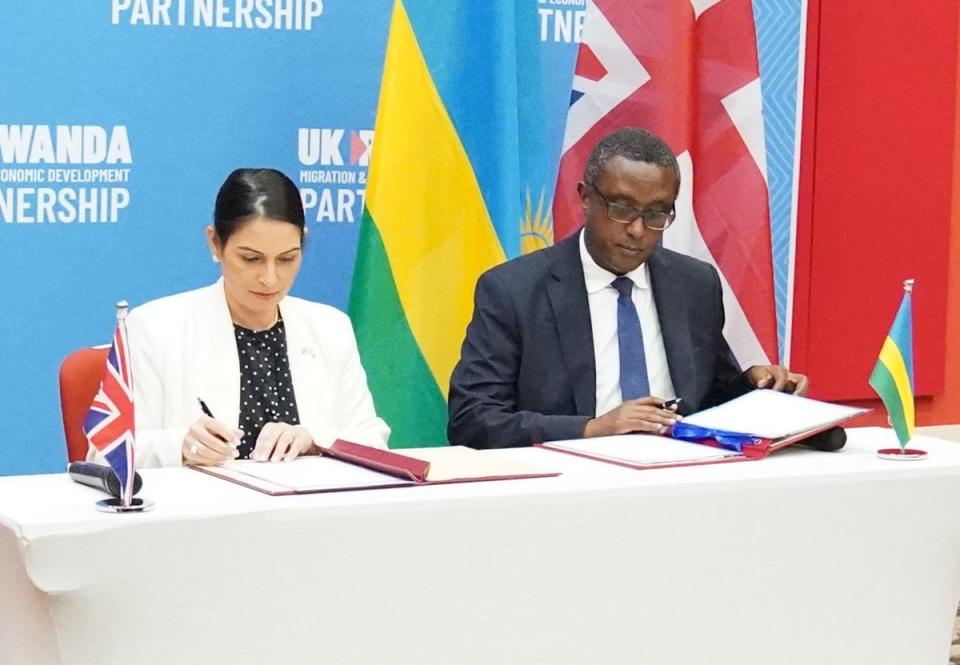High Court forces government to reveal parts of Rwanda human rights assessments after secrecy bid
The government has been forced to reveal internal advice on Rwanda’s alleged human rights abuses after a bid to keep passages secret.
The Foreign Office applied to keep parts of assessments that addressed reports of torture and killings by Rwandan authorities out of a High Court case, which is challenging the legality of Priti Patel’s deal to send asylum seekers to the country.
The first flight was due to take off in June but was grounded after a series of legal challenges, and several people due to be on the plane have subsequently been identified as potential trafficking victims.
The scheme has been halted until the legality of the policy is decided at a High Court hearing starting next month, while MPs have also questioned the government’s unevidenced claims that it will deter migrant crossings over the English Channel.
Advice on Rwanda’s human rights record issued by the Foreign Office has been requested as part of the case, but the department argued that redactions were in the “public interest” because full disclosure “would cause serious harm to the United Kingdom’s international relations, primarily (but not exclusively) with the government of Rwanda”.
The Foreign Office applied for “public interest immunity” from disclosure, which requires the court to balance competing interests and potential harm.
A judge refused the request for six extracts, save for specific words and one sentence, and granted it for the remaining four extracts in question.
In a written judgment, Lord Justice Lewis said that some of the material the government tried to redact was “already in the public domain” and could not cause further harm.
A letter from Foreign Office minister Graham Stuart claimed that sharing the contents of the extracts would harm national security “in light of Rwanda’s status as a valuable strategic partner to the United Kingdom across a range of issues including regional security, the maintenance of a strong coalition in support of Ukraine and combating the activities of criminal gangs engaged in illegal immigration”.
Lord Justice Lewis did not make a ruling on the argument but noted that “it is not immediately apparent that any disruption in relations between Rwanda and the United Kingdom would have an effect on either country’s approach to Ukraine”.
The judge said that for each extract the Foreign Office wanted to withhold, he considered the “strong public interest in not undermining international relations with a friendly state”, the “public interest in ensuring access to relevant information in this litigation”, the “evidential significance” of the material and whether it was already in the public domain.
“There is also a strong public interest in the court having access to the fullest information possible to consider whether or not the policy is lawful,” he added.
The disputed material is contained within an email and written comments by a civil servant who was asked to review the Home Office’s draft “country policy and information notes” on Rwanda.
The document, which was published in May, contained an assessment of the country’s asylum system and related human rights issues.
It found Rwanda to be a safe country, but another hearing in July revealed that the Rwandan government itself had been sent a draft to review and asked for edits.

Christopher Knight, a barrister representing eight asylum seekers, the PCS union, Detention Action and Care4Calais, opposed the Foreign Office’s secrecy bid along with other claimants and three media organisations.
In written submissions, the barrister said that the Home Office has already provided “a significant array of evidence addressing the critical views advanced by the government about the government of Rwanda”.
At a hearing on Wedneday, the barrister quoted from one of the documents written by the unnamed Foreign Office official, who said that torture and “even killings” were detailed.
Separate documents presented to a High Court hearing in July said that Rwanda was “initially excluded from the shortlist of potential partner countries for the proposed immigration policy on human rights grounds”.
The UK High Commissioner to Rwanda indicated that the country “should not be pursued as an option for the planned migration policy” in 2021.
The reasons given included that it “has been accused of recruiting refugees to conduct armed operations in neighbouring countries”, has a “poor human rights record regardless of the conventions it has signed up to” and has been criticised by the UK for extrajudicial killings, deaths in custody, enforced disappearances, torture and crackdowns on anyone critical of the regime.
Claimants who argue the policy is unlawful revealed numerous memos had been flying around the Foreign Office over the agreement, with many raising concerns about Rwanda’s human rights record and “concerns over violations for political opposition or those who oppose president Paul Kagame”.
Further advice against any agreement with Rwanda was issued by officials in the Foreign Office, including a 20 May 2021 memo saying it “continue[d] to advise No10 against engagement” and suggesting that it does not have a “functioning asylum system in compliance with Refugee Convention obligations”.
Six days later, an internal email indicated that the then-foreign secretary Dominic Raab had said the test should be “whether, with financial support, the host country could get up to European Convention of Human Rights standards”.
Rwandan government officials have denied human rights abuses, telling a press conference last month that documents revealed by the High Court case were based on “incorrect information”.
A full judicial review of the policy will start on 5 September and a final ruling on its legality is not expected until after a linked legal challenge is heard in October.

